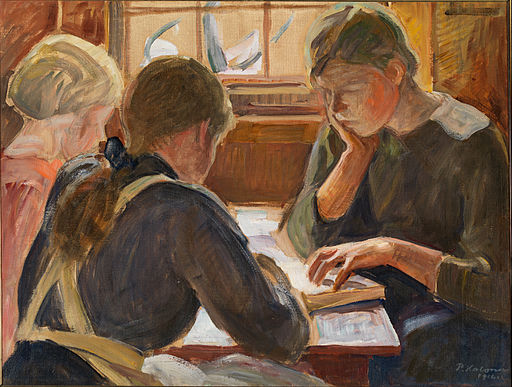This post was originally published in Volume 5, Issue 3, 2015 edition of Credo Magazine at credomag.com/magazine_issue.
With so much to teach our children and so little time, why should we include church history? What did Isaac Newton mean when he said he could look further because he stood on the shoulders of giants? Should we limit ourselves to stand there, taking advantage of the accomplishments of our great predecessors, and only look forward? This conclusion may seem natural in our age, when we’re told we should live in the present and look to the future. Newton’s reasoning, however, was most likely very different. There are many reasons why we should look to the past and guide our children in that discovery.
We Can’t Hide from the Past
When we read Newton’s quote, it’s easy to forget he could benefit from the discoveries of the giants who went before him because he thoroughly studied their teachings.
The past is part of us. Church history is embedded in the doctrines we take for granted, in our interpretation of the Bible and in our liturgy. It even influences the way we see other Christians and the world around us, and the way we face certain choices and challenges. Studying church history helps us to understand what we believe and why, and to make informed decisions.
Church History Helps Us to Appreciate God’s Sovereign Plan
In spite of the church’s problems, failures, and divisions, Christ has kept and is still keeping the promise he made in Caesarea, “I will build my church, and the gates of hell shall not prevail against it” (Matt. 16:18). It’s important for our children to know that the story of God’s preservation of his people in Jesus Christ—the overarching theme of Scriptures—didn’t end with the Book of Acts. It has continued throughout the 2,000 years of history from the apostles until today and will continue until the consummation. It includes us and our children.
Studying church history helps us to see beyond our limited and immediate situation. It gives us confidence in God’s promises and moves us to praise him for their historical fulfillment, saying, like the prophet Samuel, “Till now the LORD has helped us” (1Sam. 7:12). This appreciation of God’s help and sustenance in the past is frequently encouraged in Scriptures. It’s also important, as much as possible, to give our children a general idea of the whole history of the church and not only of the periods or individuals we particularly like, because God has been with his church and has preserved his gospel in every age.
Church History Helps Us to Appreciate Tradition
The word tradition makes some Protestants uncomfortable because of the meaning it has acquired in the Roman Catholic Church. When the Reformers talked about tradition, however, they referred to the church’s general consensus of interpreting the Bible. Much of our Protestant tradition is exemplified in our historical confessions and creeds.
While it’s true that the tradition of the church has no authority independent of the Scriptures, this tradition is very valuable as a summary of biblical doctrine. We’re still exhorted to examine “the Scriptures daily to see if these things were so” (Acts 17:11). At the same time, the creeds and confessions our forefathers have prayerfully and carefully drafted and the church has wisely tested prevent us from being “carried about by every wind of doctrine” (Eph. 4:14) and from reinventing a sound and proven theological wheel.
Church History Helps Us to Appreciate our Church Family
Learning from others and taking their ideas into serious consideration is a wonderful exercise in humility and respect. We should take our children through the pages of church history as we would take them to a foreign country, teaching them to see things from a different perspective, without superimposing our experiences and ideas. Eric Ives, author of Lady Jane Grey: A Tudor Mystery, wrote, “In the West, growing secularization ensures that relatively few people even understand the issues which meant so much to [Jane].” Making an effort to understand unfamiliar issues by becoming acquainted with historical characters and their times will bring us closer to our church family of pilgrims and strangers of all ages. Biographies are especially valuable in this sense, as they help us to gain deeper insight into the convictions, dreams, fears, and concerns of others.
Church History Helps Us to Understand Theology
Our Christian doctrine didn’t develop in a vacuum. Contrary to what some people believe, it was not shaped by a few men in some ancient church council. In fact, church councils have often been called to discuss and find biblical answers to questions that had been widely circulating among the people.
For example, the Council of Nicea was the result of a long, even literal fight between the followers of Arius and those who maintained the doctrine of the full divinity of Christ. Most of the bishops who attended the council had suffered greatly under the Diocletian persecution. Some had lost some limbs or their sight.
To them, the doctrine of the true nature of Christ was of the utmost importance. An attendant to the council, Athanasius, continued to defend this doctrine at the cost of exile and under a constant threat of death. Reading about this passion challenges our insipid convictions and comfortable lives and moves us to take into deeper consideration that invaluable doctrine.
Likewise, understanding Luther’s heart wrenching struggle of conscience and his gradual and conflicted discovery of the gospel gives us a much deeper understanding of this gospel and a fuller appreciation of its ramifications.
In a sense, then, we are truly standing on the shoulders of the theological giants of our past and benefiting from their teachings. But just standing there and looking further might not do us much good. In fact, as history teaches us, it’s dangerous to look forward without a strong knowledge of the past. It’s much safer (and humbler) to sit on their shoulders, where we can interact with them, draw from their wisdom, and be deeply touched by their devotion.
Editor’s Note: You can find more related articles, children’s series, and other works by Simonetta at her website Simonetta Carr and her books.

Simonetta Carr was born in Italy and has lived and worked in different cultures. She worked for a while as an elementary school teacher and then taught her own eight children for many years. Besides writing books, she has contributed to newspapers and magazines and has translated the works of several authors from English into Italian. Presently, she lives in San Diego with her husband Thomas and their youngest son.

